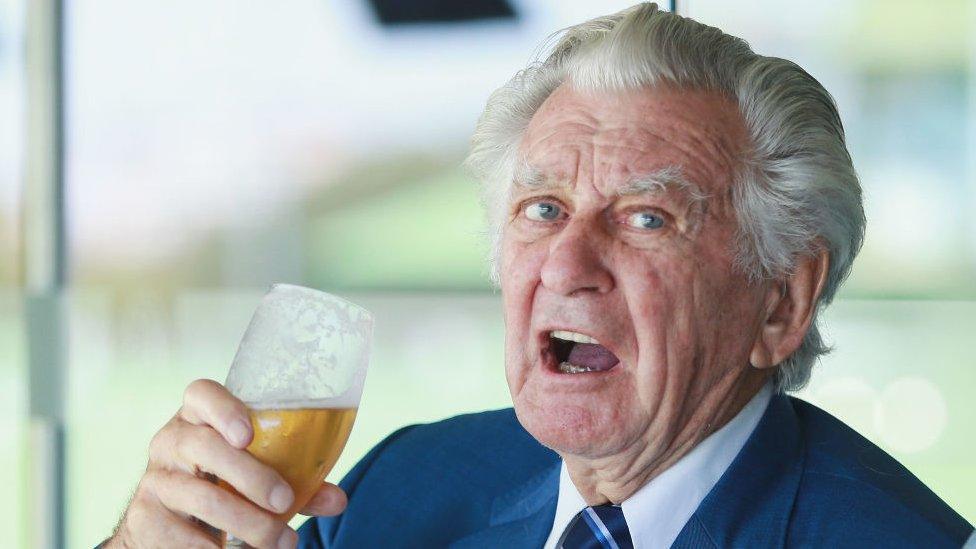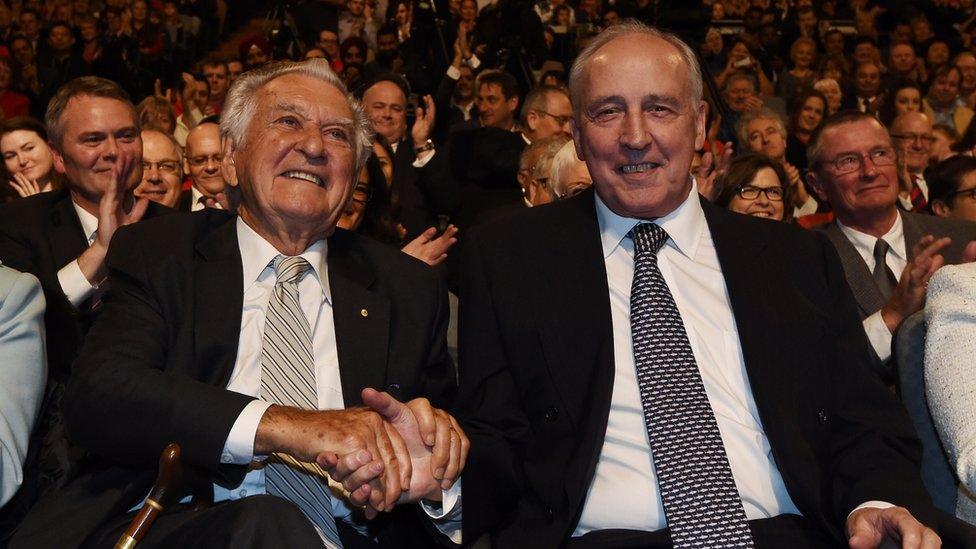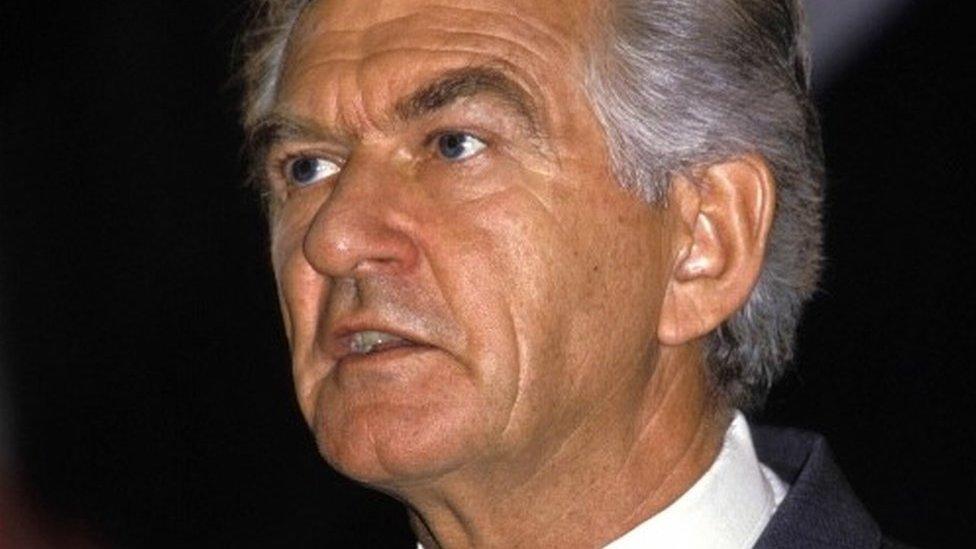Bob Hawke: Australia's former PM dies at 89
- Published
Five key moments from Bob Hawke's life
Former Australian prime minister and Labor Party leader Bob Hawke, who dominated the country's politics in the 1980s, has died at the age of 89.
The charismatic politician, renowned for his love of beer and cricket, served from 1983 to 1991 and is credited with modernising the economy.
He was the centre-left Labor Party's longest-serving PM, who achieved the highest approval ratings of any leader.
He died "peacefully at home", his wife said in a statement.
"Today we lost Bob Hawke, a great Australian - many would say the greatest Australian of the post-war era," Blanche d'Alpuget added.
Who was Bob Hawke?
Mr Hawke joined the Labor Party at the age of 18 in 1947 and would go on to win a Rhodes Scholarship to the University of Oxford in 1953.
He later joined the trade union movement, rising to become president of the Australian Council of Trade Unions by 1969.
He first won a seat in parliament in 1980 and became Labor leader in 1983. He and Labor won a general election by a landslide soon after.
Mr Hawke was known for his maverick style and will be remembered as Australia's "larrikin" leader - the prime minister who loved a drink and joke, and made the serious work of politics look like fun.
He set a world record for drinking a yard (1.4l) of beer in 11 seconds while at Oxford University, and he would still perform his party trick of downing a glass of beer at cricket matches well into his late 80s.
He cried publicly a number of times - most famously in 1989 at a memorial service at Parliament House following the crackdown on Chinese students at Beijing's Tiananmen square.

Bob Hawke was known for his "larrikin" behaviour
He was known for his concern for Australia's vulnerable, once declaring that he wanted to create a country where there were "no second-class Australians". He created Australia's universal healthcare system, Medicare.
But he is also lauded by many for making radical market reforms, including floating the Australian dollar.
"Among his proudest achievements were large increases in the proportion of children finishing high school, his role in ending apartheid in South Africa, and his successful international campaign to protect Antarctica from mining," the statement from his family said.
He "abhorred racism and bigotry", it added, and "foresaw the Asian Century".

The loveable larrikin
By Hywel Griffith, BBC Sydney Correspondent
Australia loves a larrikin - a rambunctious rogue who does not care about convention. In Bob Hawke, it found a natural leader, happy to play the role. He still holds the highest approval rating of any Australian prime minister.
But his antics belied a sharp political mind that understood the need to build consensus and keep the voters on his side. His landslide election victory in 1983 gave him a mandate to push through contentious changes, with an agenda of privatisation and deregulation at odds with his party's traditions.
But some of his reforms were clearly too ambitious - he did not achieve his goal of "no Australian child living in poverty".
Despite losing office and divorcing his wife to marry his long-term mistress, Bob Hawke regularly appeared in public, his reputation restored and his place in history assured. For most Australians he will always be remembered as the prime minister who loved a drink and joke, and made the serious work of politics look like fun.

What has the reaction been?
Tributes are pouring in for a man who was highly popular with the Australian public and led Labor to four election victories.
"The labour movement salutes our greatest son," tweeted Bill Shorten, current Labor Party leader.
Prime Minister Scott Morrison called him "a great Australian", adding that he had "a unique ability to speak to all Australians and will be greatly missed".
Former Labor PM Julia Gillard tweeted that he was "the greatest peacetime leader Australia has ever had" and sent her condolences to his family, while Kevin Rudd - Ms Gillard's predecessor and successor - called him "a giant of Australian politics".
Allow X content?
This article contains content provided by X. We ask for your permission before anything is loaded, as they may be using cookies and other technologies. You may want to read X’s cookie policy, external and privacy policy, external before accepting. To view this content choose ‘accept and continue’.

Australian actor Russell Crowe described him as a "great man who never lost his humility":
Allow X content?
This article contains content provided by X. We ask for your permission before anything is loaded, as they may be using cookies and other technologies. You may want to read X’s cookie policy, external and privacy policy, external before accepting. To view this content choose ‘accept and continue’.

Bob Hawke's death comes days before Australians go to the polls in a federal election.
His former rival and the man who succeeded him as Labor leader and prime minister, Paul Keating, said that the pair had enjoyed a "great partnership".

Paul Keating, right, succeeded Bob Hawke as prime minister
"What remains and what will endure from that partnership are the monumental foundations of modern Australia," he said.
- Published16 May 2019
